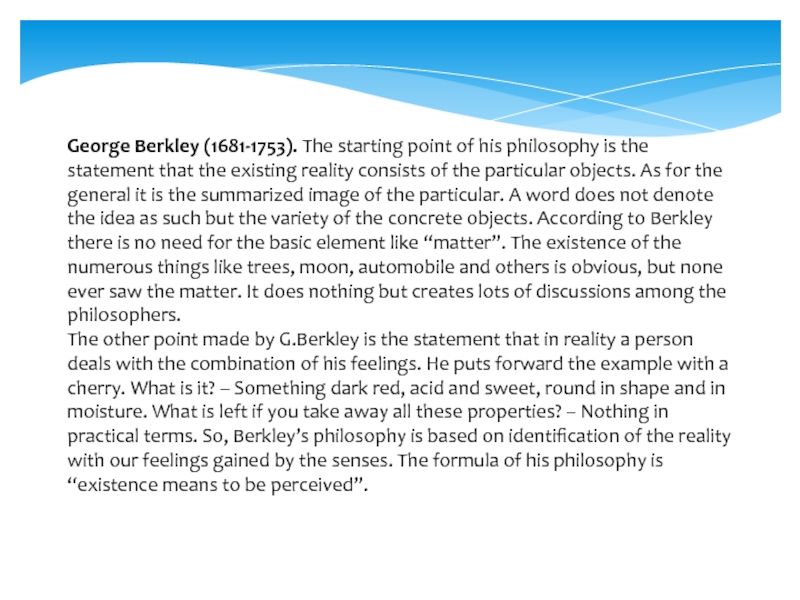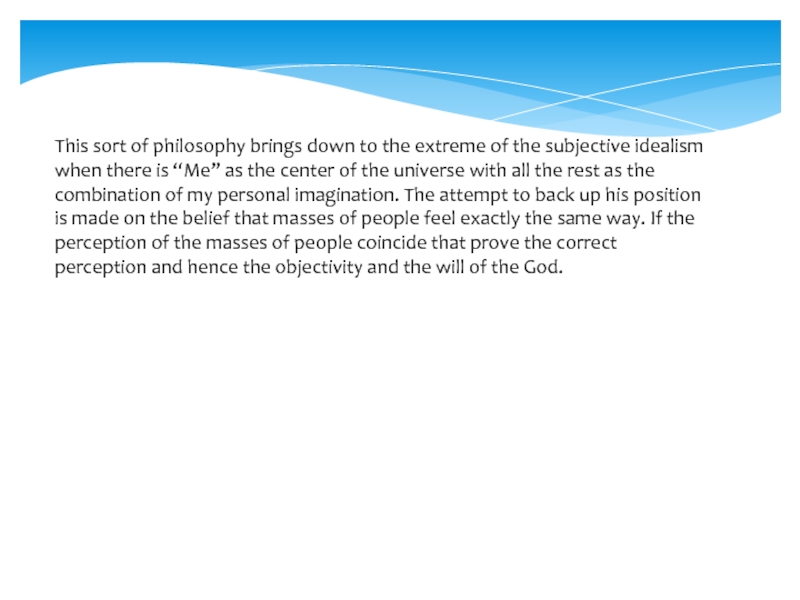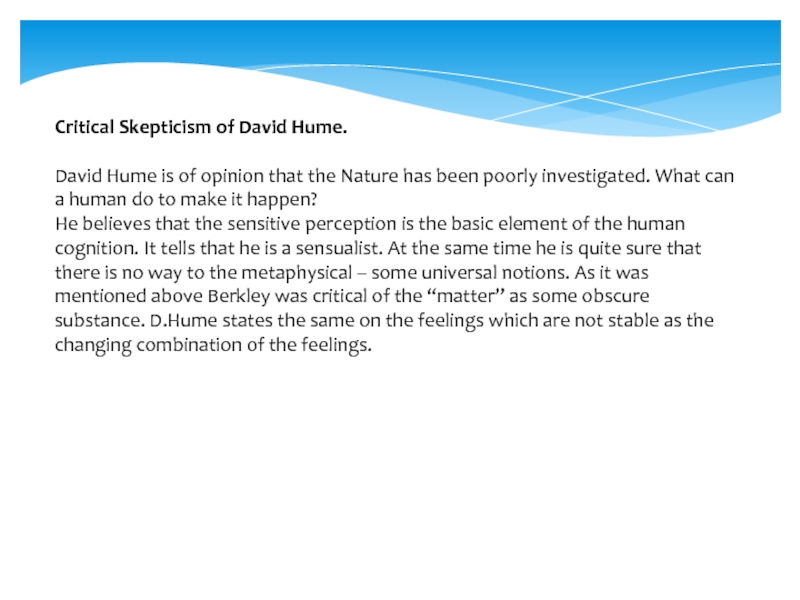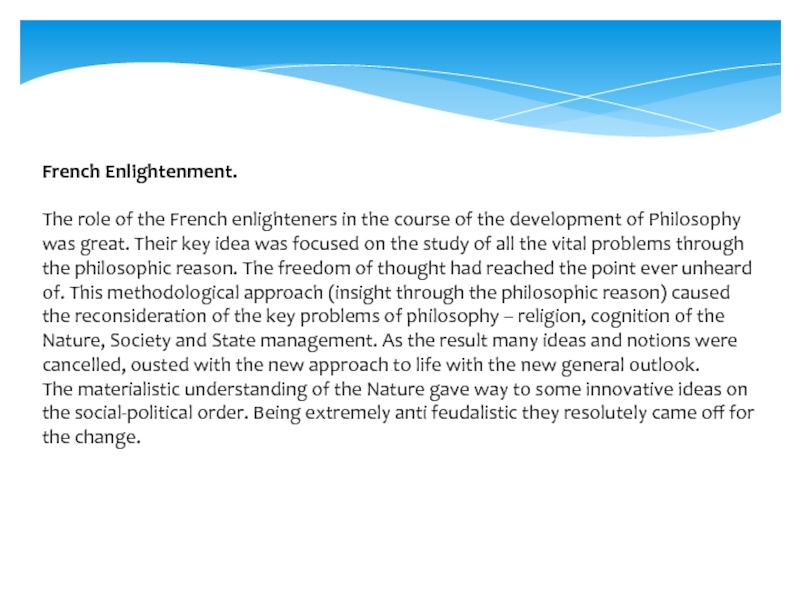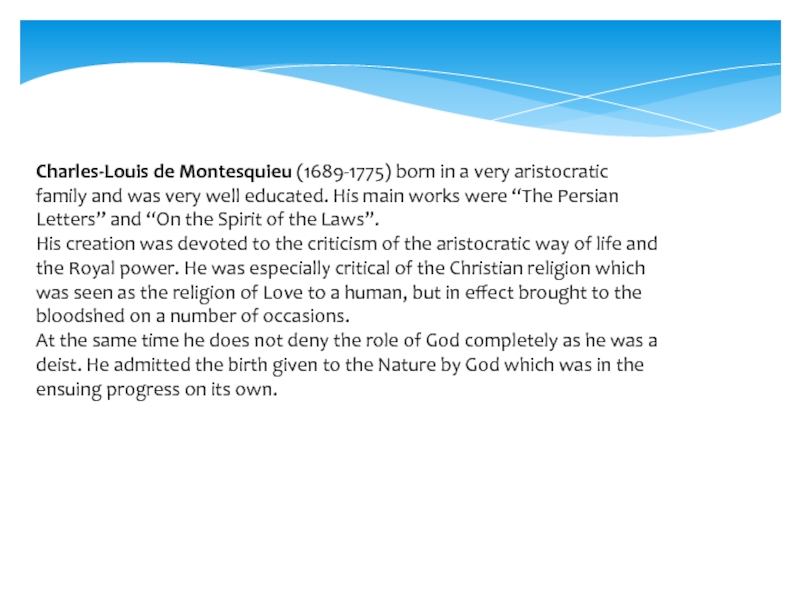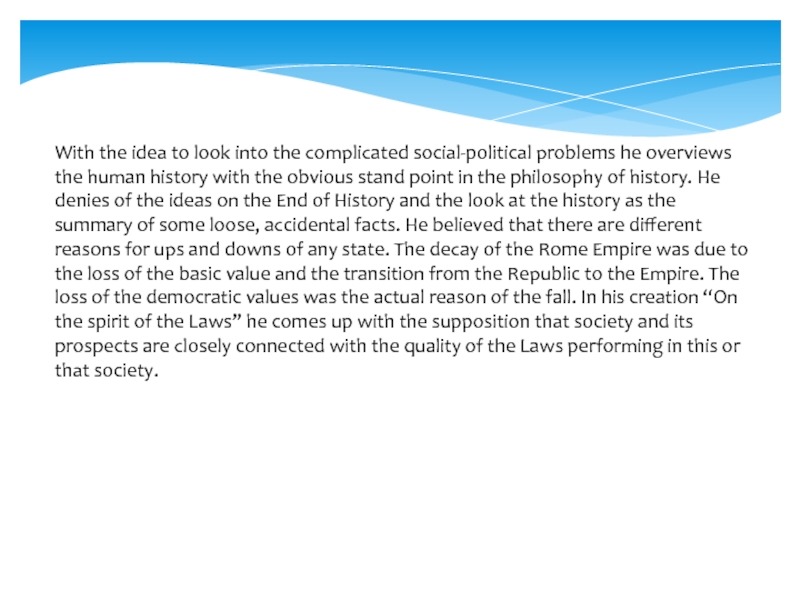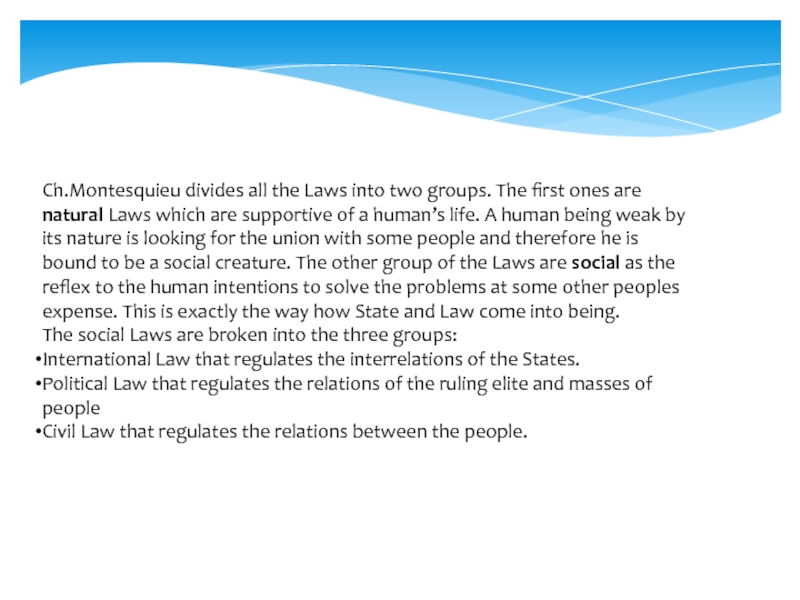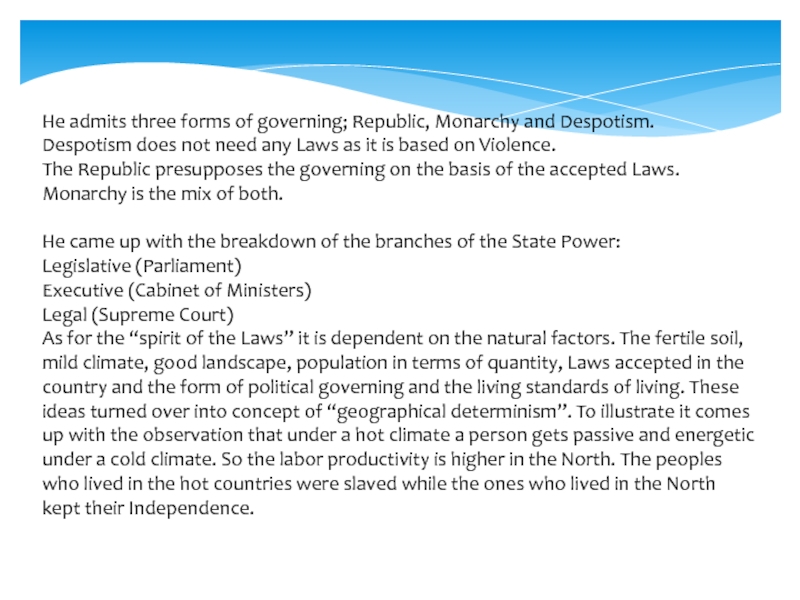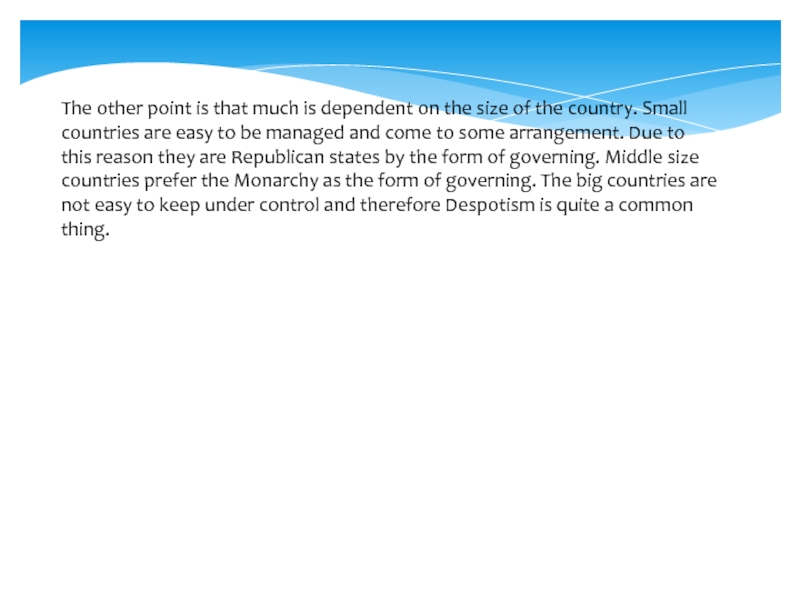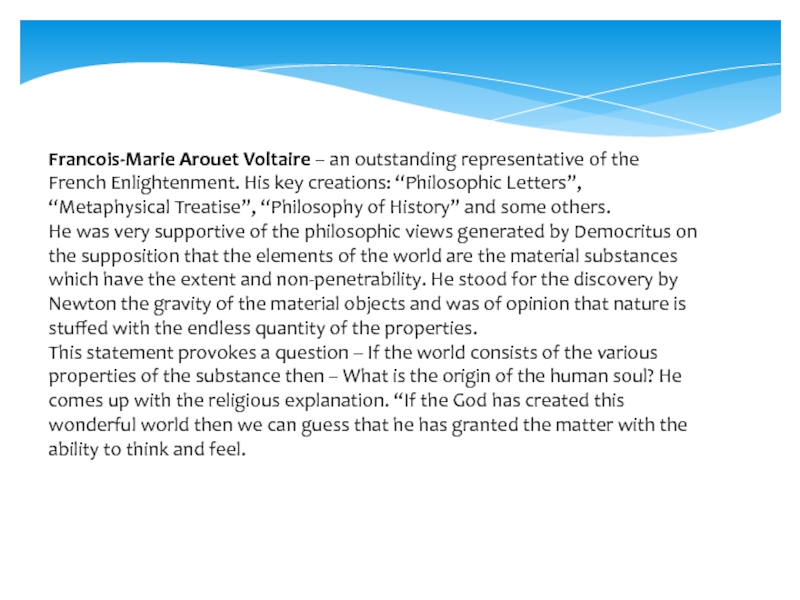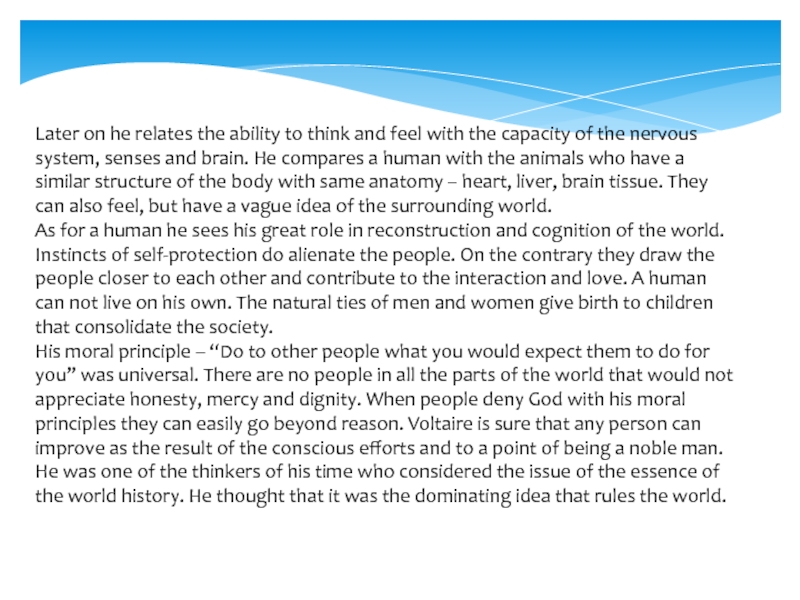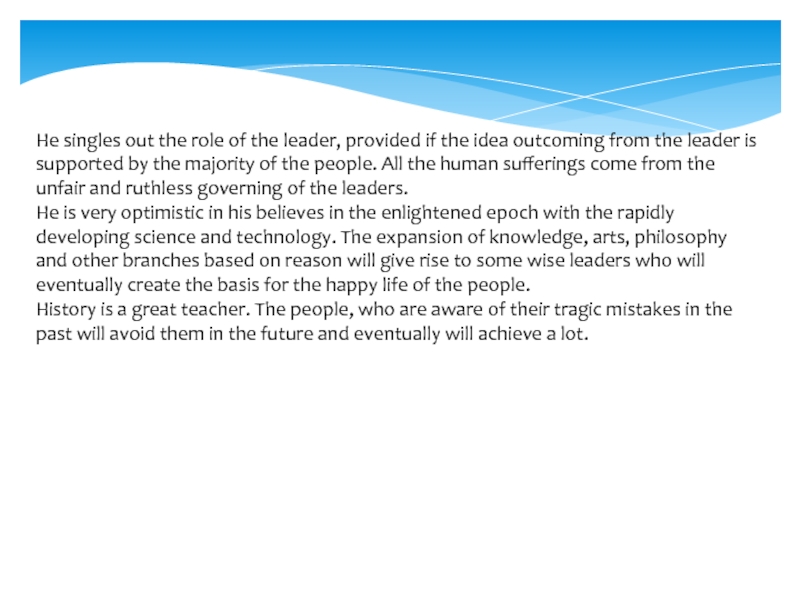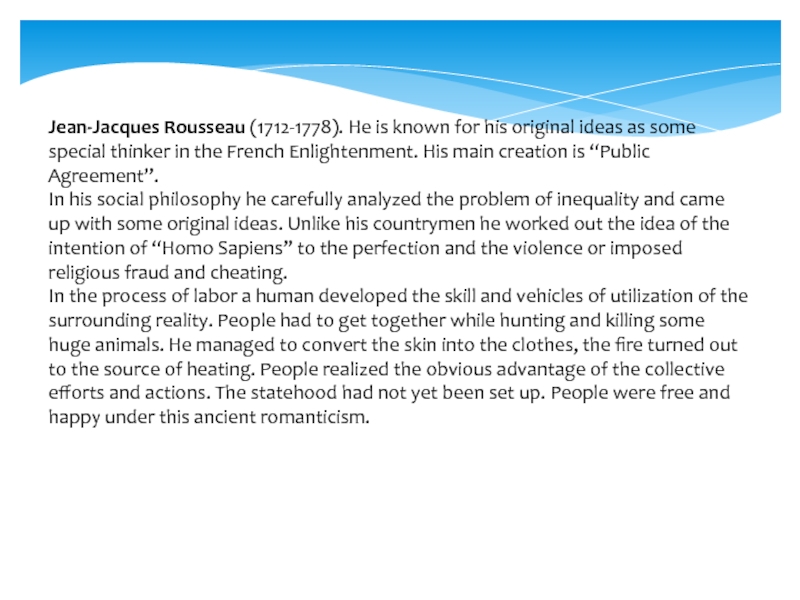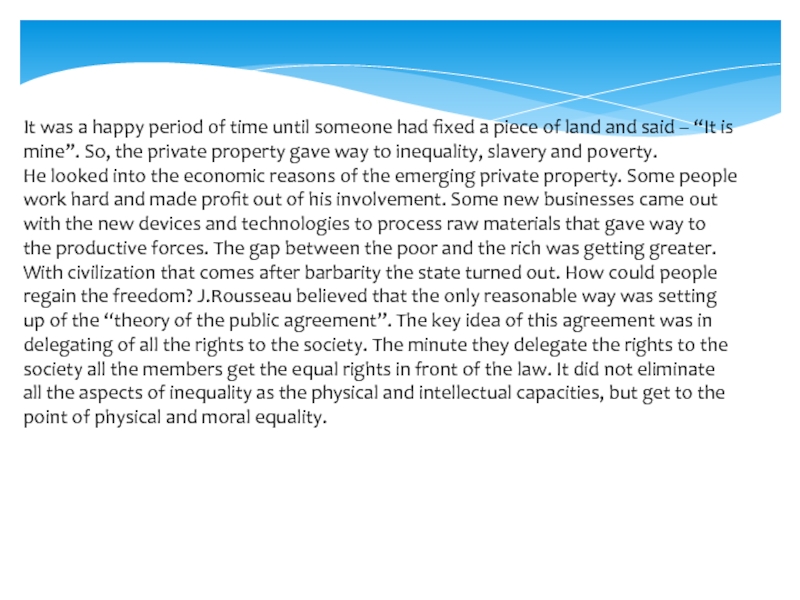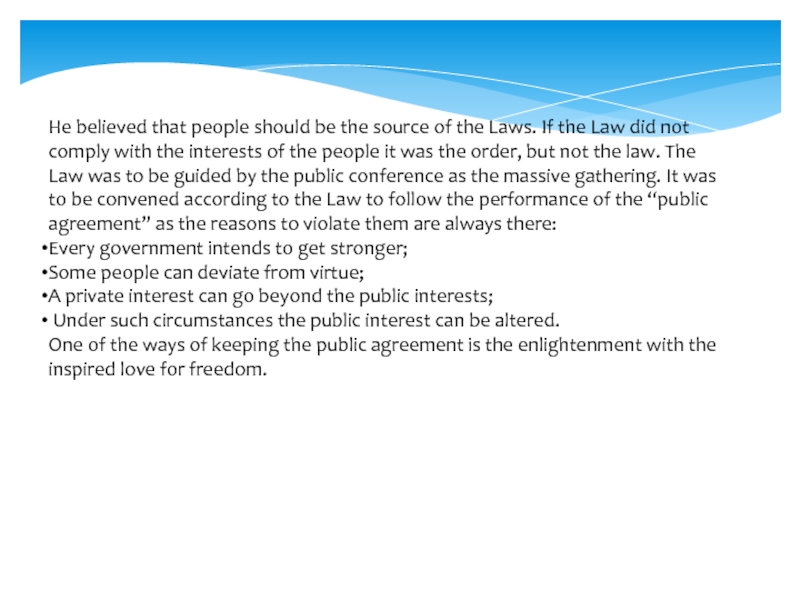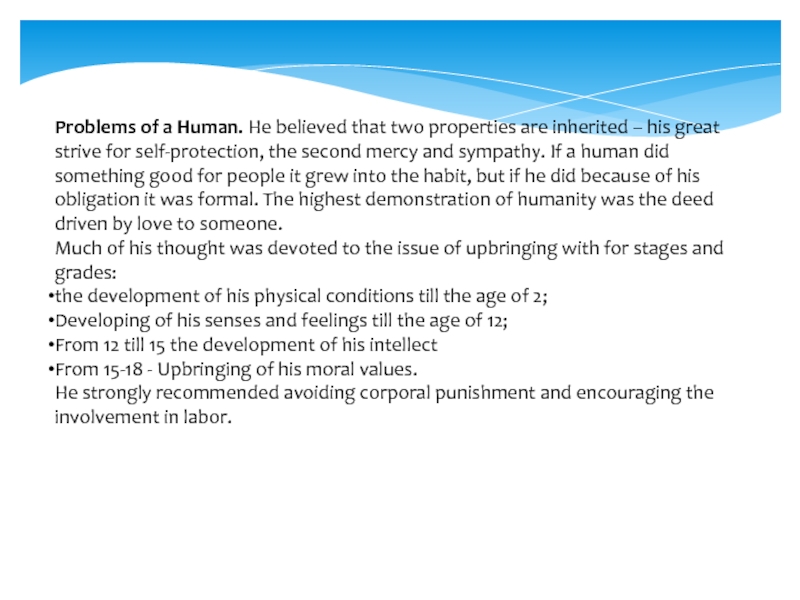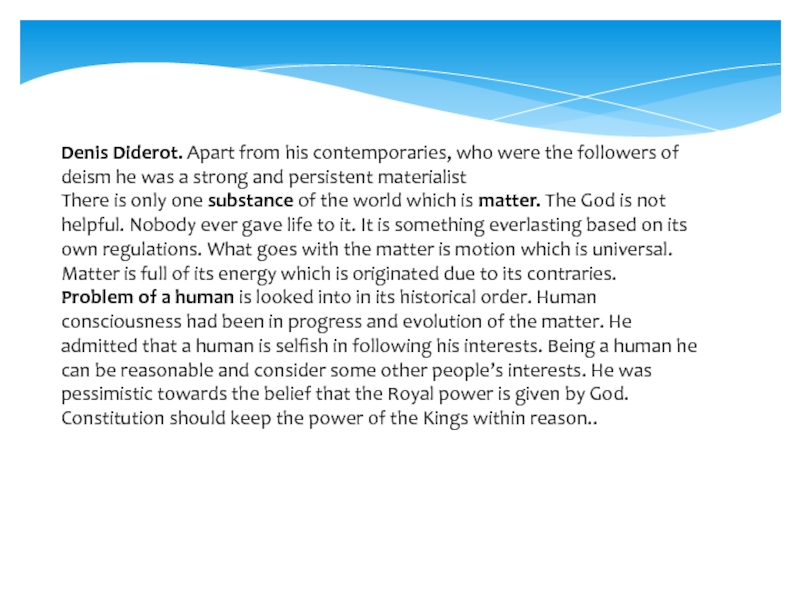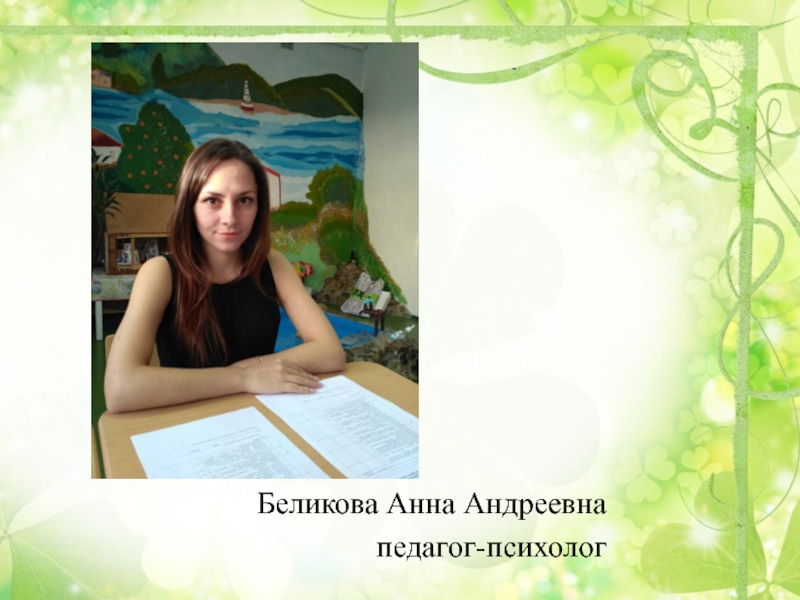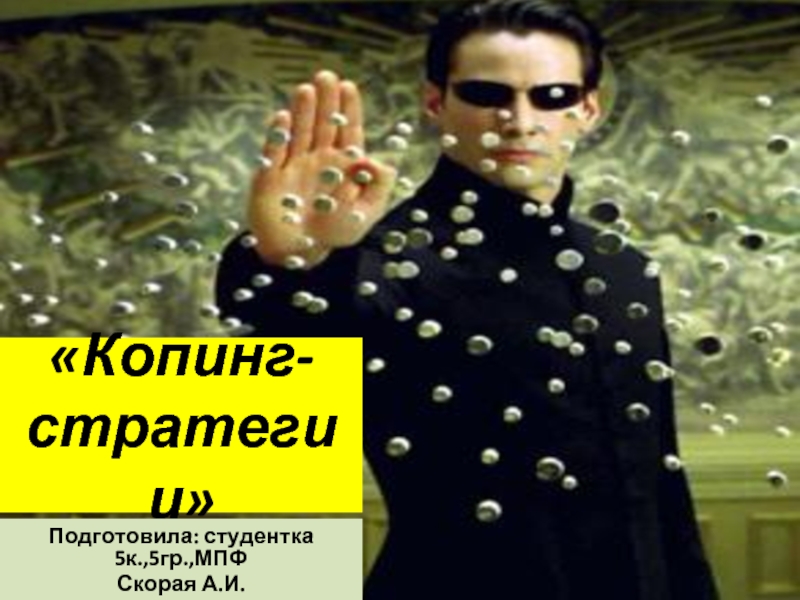18-th century there was a strong trend in the social life of Europe called as the Enlightenment. It was the intellectual movement with the recognition of knowledge as key value. The belief in knowledge was associated with the emancipation of a human from the fears and prejudices. It was the time when the motto: “Scientia potentia est” came into the turn-over of the people.
The peculiar feature of the Enlightenment was the stress on the ideological aspects of the theories under development. What was the ideological incentive of the of that time ?:
1. The belief in the future with the dominance of reason.
2. Emancipation of all the out-of-date traditions and customs with considerable reconsideration.
3. The necessity to pave the way for the development of science and technology with the demonstration of the power of knowledge and related great future.
4. Protection of all the human rights of a person.
5. Emancipation of Philosophy from the abstract schemes with the lack of proof.
6. Liberation of people from the tenets of the blind religious believes with the obvious focus on the materialistic philosophy.
- Главная
- Разное
- Дизайн
- Бизнес и предпринимательство
- Аналитика
- Образование
- Развлечения
- Красота и здоровье
- Финансы
- Государство
- Путешествия
- Спорт
- Недвижимость
- Армия
- Графика
- Культурология
- Еда и кулинария
- Лингвистика
- Английский язык
- Астрономия
- Алгебра
- Биология
- География
- Детские презентации
- Информатика
- История
- Литература
- Маркетинг
- Математика
- Медицина
- Менеджмент
- Музыка
- МХК
- Немецкий язык
- ОБЖ
- Обществознание
- Окружающий мир
- Педагогика
- Русский язык
- Технология
- Физика
- Философия
- Химия
- Шаблоны, картинки для презентаций
- Экология
- Экономика
- Юриспруденция
Philosophy of the XVIII Century. Enlightenment презентация
Содержание
- 1. Philosophy of the XVIII Century. Enlightenment
- 2. George Berkley (1681-1753). The starting point of
- 3. This sort of philosophy brings down to
- 4. Critical Skepticism of David Hume.
- 5. French Enlightenment. The role of the
- 6. Charles-Louis de Montesquieu (1689-1775) born in a
- 7. With the idea to look into the
- 8. Ch.Montesquieu divides all the Laws into two
- 9. He admits three forms of governing; Republic,
- 10. The other point is that much is
- 11. Francois-Marie Arouet Voltaire – an outstanding representative
- 12. Later on he relates the ability to
- 13. He singles out the role of the
- 14. Jean-Jacques Rousseau (1712-1778). He is known for
- 15. It was a happy period of time
- 16. He believed that people should be the
- 17. Problems of a Human. He believed that
- 18. Denis Diderot. Apart from his contemporaries, who
Слайд 2George Berkley (1681-1753). The starting point of his philosophy is the
statement that the existing reality consists of the particular objects. As for the general it is the summarized image of the particular. A word does not denote the idea as such but the variety of the concrete objects. According to Berkley there is no need for the basic element like “matter”. The existence of the numerous things like trees, moon, automobile and others is obvious, but none ever saw the matter. It does nothing but creates lots of discussions among the philosophers.
The other point made by G.Berkley is the statement that in reality a person deals with the combination of his feelings. He puts forward the example with a cherry. What is it? – Something dark red, acid and sweet, round in shape and in moisture. What is left if you take away all these properties? – Nothing in practical terms. So, Berkley’s philosophy is based on identification of the reality with our feelings gained by the senses. The formula of his philosophy is “existence means to be perceived”.
The other point made by G.Berkley is the statement that in reality a person deals with the combination of his feelings. He puts forward the example with a cherry. What is it? – Something dark red, acid and sweet, round in shape and in moisture. What is left if you take away all these properties? – Nothing in practical terms. So, Berkley’s philosophy is based on identification of the reality with our feelings gained by the senses. The formula of his philosophy is “existence means to be perceived”.
Слайд 3This sort of philosophy brings down to the extreme of the
subjective idealism when there is “Me” as the center of the universe with all the rest as the combination of my personal imagination. The attempt to back up his position is made on the belief that masses of people feel exactly the same way. If the perception of the masses of people coincide that prove the correct perception and hence the objectivity and the will of the God.
Слайд 4Critical Skepticism of David Hume.
David
Hume is of opinion that the Nature has been poorly investigated. What can a human do to make it happen?
He believes that the sensitive perception is the basic element of the human cognition. It tells that he is a sensualist. At the same time he is quite sure that there is no way to the metaphysical – some universal notions. As it was mentioned above Berkley was critical of the “matter” as some obscure substance. D.Hume states the same on the feelings which are not stable as the changing combination of the feelings.
He believes that the sensitive perception is the basic element of the human cognition. It tells that he is a sensualist. At the same time he is quite sure that there is no way to the metaphysical – some universal notions. As it was mentioned above Berkley was critical of the “matter” as some obscure substance. D.Hume states the same on the feelings which are not stable as the changing combination of the feelings.
Слайд 5French Enlightenment.
The role of the French enlighteners in the course of
the development of Philosophy was great. Their key idea was focused on the study of all the vital problems through the philosophic reason. The freedom of thought had reached the point ever unheard of. This methodological approach (insight through the philosophic reason) caused the reconsideration of the key problems of philosophy – religion, cognition of the Nature, Society and State management. As the result many ideas and notions were cancelled, ousted with the new approach to life with the new general outlook.
The materialistic understanding of the Nature gave way to some innovative ideas on the social-political order. Being extremely anti feudalistic they resolutely came off for the change.
The materialistic understanding of the Nature gave way to some innovative ideas on the social-political order. Being extremely anti feudalistic they resolutely came off for the change.
Слайд 6Charles-Louis de Montesquieu (1689-1775) born in a very aristocratic family and
was very well educated. His main works were “The Persian Letters” and “On the Spirit of the Laws”.
His creation was devoted to the criticism of the aristocratic way of life and the Royal power. He was especially critical of the Christian religion which was seen as the religion of Love to a human, but in effect brought to the bloodshed on a number of occasions.
At the same time he does not deny the role of God completely as he was a deist. He admitted the birth given to the Nature by God which was in the ensuing progress on its own.
His creation was devoted to the criticism of the aristocratic way of life and the Royal power. He was especially critical of the Christian religion which was seen as the religion of Love to a human, but in effect brought to the bloodshed on a number of occasions.
At the same time he does not deny the role of God completely as he was a deist. He admitted the birth given to the Nature by God which was in the ensuing progress on its own.
Слайд 7With the idea to look into the complicated social-political problems he
overviews the human history with the obvious stand point in the philosophy of history. He denies of the ideas on the End of History and the look at the history as the summary of some loose, accidental facts. He believed that there are different reasons for ups and downs of any state. The decay of the Rome Empire was due to the loss of the basic value and the transition from the Republic to the Empire. The loss of the democratic values was the actual reason of the fall. In his creation “On the spirit of the Laws” he comes up with the supposition that society and its prospects are closely connected with the quality of the Laws performing in this or that society.
Слайд 8Ch.Montesquieu divides all the Laws into two groups. The first ones
are natural Laws which are supportive of a human’s life. A human being weak by its nature is looking for the union with some people and therefore he is bound to be a social creature. The other group of the Laws are social as the reflex to the human intentions to solve the problems at some other peoples expense. This is exactly the way how State and Law come into being.
The social Laws are broken into the three groups:
International Law that regulates the interrelations of the States.
Political Law that regulates the relations of the ruling elite and masses of people
Civil Law that regulates the relations between the people.
The social Laws are broken into the three groups:
International Law that regulates the interrelations of the States.
Political Law that regulates the relations of the ruling elite and masses of people
Civil Law that regulates the relations between the people.
Слайд 9He admits three forms of governing; Republic, Monarchy and Despotism.
Despotism does
not need any Laws as it is based on Violence.
The Republic presupposes the governing on the basis of the accepted Laws.
Monarchy is the mix of both.
He came up with the breakdown of the branches of the State Power:
Legislative (Parliament)
Executive (Cabinet of Ministers)
Legal (Supreme Court)
As for the “spirit of the Laws” it is dependent on the natural factors. The fertile soil, mild climate, good landscape, population in terms of quantity, Laws accepted in the country and the form of political governing and the living standards of living. These ideas turned over into concept of “geographical determinism”. To illustrate it comes up with the observation that under a hot climate a person gets passive and energetic under a cold climate. So the labor productivity is higher in the North. The peoples who lived in the hot countries were slaved while the ones who lived in the North kept their Independence.
The Republic presupposes the governing on the basis of the accepted Laws.
Monarchy is the mix of both.
He came up with the breakdown of the branches of the State Power:
Legislative (Parliament)
Executive (Cabinet of Ministers)
Legal (Supreme Court)
As for the “spirit of the Laws” it is dependent on the natural factors. The fertile soil, mild climate, good landscape, population in terms of quantity, Laws accepted in the country and the form of political governing and the living standards of living. These ideas turned over into concept of “geographical determinism”. To illustrate it comes up with the observation that under a hot climate a person gets passive and energetic under a cold climate. So the labor productivity is higher in the North. The peoples who lived in the hot countries were slaved while the ones who lived in the North kept their Independence.
Слайд 10The other point is that much is dependent on the size
of the country. Small countries are easy to be managed and come to some arrangement. Due to this reason they are Republican states by the form of governing. Middle size countries prefer the Monarchy as the form of governing. The big countries are not easy to keep under control and therefore Despotism is quite a common thing.
Слайд 11Francois-Marie Arouet Voltaire – an outstanding representative of the French Enlightenment.
His key creations: “Philosophic Letters”, “Metaphysical Treatise”, “Philosophy of History” and some others.
He was very supportive of the philosophic views generated by Democritus on the supposition that the elements of the world are the material substances which have the extent and non-penetrability. He stood for the discovery by Newton the gravity of the material objects and was of opinion that nature is stuffed with the endless quantity of the properties.
This statement provokes a question – If the world consists of the various properties of the substance then – What is the origin of the human soul? He comes up with the religious explanation. “If the God has created this wonderful world then we can guess that he has granted the matter with the ability to think and feel.
He was very supportive of the philosophic views generated by Democritus on the supposition that the elements of the world are the material substances which have the extent and non-penetrability. He stood for the discovery by Newton the gravity of the material objects and was of opinion that nature is stuffed with the endless quantity of the properties.
This statement provokes a question – If the world consists of the various properties of the substance then – What is the origin of the human soul? He comes up with the religious explanation. “If the God has created this wonderful world then we can guess that he has granted the matter with the ability to think and feel.
Слайд 12Later on he relates the ability to think and feel with
the capacity of the nervous system, senses and brain. He compares a human with the animals who have a similar structure of the body with same anatomy – heart, liver, brain tissue. They can also feel, but have a vague idea of the surrounding world.
As for a human he sees his great role in reconstruction and cognition of the world. Instincts of self-protection do alienate the people. On the contrary they draw the people closer to each other and contribute to the interaction and love. A human can not live on his own. The natural ties of men and women give birth to children that consolidate the society.
His moral principle – “Do to other people what you would expect them to do for you” was universal. There are no people in all the parts of the world that would not appreciate honesty, mercy and dignity. When people deny God with his moral principles they can easily go beyond reason. Voltaire is sure that any person can improve as the result of the conscious efforts and to a point of being a noble man.
He was one of the thinkers of his time who considered the issue of the essence of the world history. He thought that it was the dominating idea that rules the world.
As for a human he sees his great role in reconstruction and cognition of the world. Instincts of self-protection do alienate the people. On the contrary they draw the people closer to each other and contribute to the interaction and love. A human can not live on his own. The natural ties of men and women give birth to children that consolidate the society.
His moral principle – “Do to other people what you would expect them to do for you” was universal. There are no people in all the parts of the world that would not appreciate honesty, mercy and dignity. When people deny God with his moral principles they can easily go beyond reason. Voltaire is sure that any person can improve as the result of the conscious efforts and to a point of being a noble man.
He was one of the thinkers of his time who considered the issue of the essence of the world history. He thought that it was the dominating idea that rules the world.
Слайд 13He singles out the role of the leader, provided if the
idea outcoming from the leader is supported by the majority of the people. All the human sufferings come from the unfair and ruthless governing of the leaders.
He is very optimistic in his believes in the enlightened epoch with the rapidly developing science and technology. The expansion of knowledge, arts, philosophy and other branches based on reason will give rise to some wise leaders who will eventually create the basis for the happy life of the people.
History is a great teacher. The people, who are aware of their tragic mistakes in the past will avoid them in the future and eventually will achieve a lot.
He is very optimistic in his believes in the enlightened epoch with the rapidly developing science and technology. The expansion of knowledge, arts, philosophy and other branches based on reason will give rise to some wise leaders who will eventually create the basis for the happy life of the people.
History is a great teacher. The people, who are aware of their tragic mistakes in the past will avoid them in the future and eventually will achieve a lot.
Слайд 14Jean-Jacques Rousseau (1712-1778). He is known for his original ideas as
some special thinker in the French Enlightenment. His main creation is “Public Agreement”.
In his social philosophy he carefully analyzed the problem of inequality and came up with some original ideas. Unlike his countrymen he worked out the idea of the intention of “Homo Sapiens” to the perfection and the violence or imposed religious fraud and cheating.
In the process of labor a human developed the skill and vehicles of utilization of the surrounding reality. People had to get together while hunting and killing some huge animals. He managed to convert the skin into the clothes, the fire turned out to the source of heating. People realized the obvious advantage of the collective efforts and actions. The statehood had not yet been set up. People were free and happy under this ancient romanticism.
In his social philosophy he carefully analyzed the problem of inequality and came up with some original ideas. Unlike his countrymen he worked out the idea of the intention of “Homo Sapiens” to the perfection and the violence or imposed religious fraud and cheating.
In the process of labor a human developed the skill and vehicles of utilization of the surrounding reality. People had to get together while hunting and killing some huge animals. He managed to convert the skin into the clothes, the fire turned out to the source of heating. People realized the obvious advantage of the collective efforts and actions. The statehood had not yet been set up. People were free and happy under this ancient romanticism.
Слайд 15It was a happy period of time until someone had fixed
a piece of land and said – “It is mine”. So, the private property gave way to inequality, slavery and poverty.
He looked into the economic reasons of the emerging private property. Some people work hard and made profit out of his involvement. Some new businesses came out with the new devices and technologies to process raw materials that gave way to the productive forces. The gap between the poor and the rich was getting greater.
With civilization that comes after barbarity the state turned out. How could people regain the freedom? J.Rousseau believed that the only reasonable way was setting up of the “theory of the public agreement”. The key idea of this agreement was in delegating of all the rights to the society. The minute they delegate the rights to the society all the members get the equal rights in front of the law. It did not eliminate all the aspects of inequality as the physical and intellectual capacities, but get to the point of physical and moral equality.
He looked into the economic reasons of the emerging private property. Some people work hard and made profit out of his involvement. Some new businesses came out with the new devices and technologies to process raw materials that gave way to the productive forces. The gap between the poor and the rich was getting greater.
With civilization that comes after barbarity the state turned out. How could people regain the freedom? J.Rousseau believed that the only reasonable way was setting up of the “theory of the public agreement”. The key idea of this agreement was in delegating of all the rights to the society. The minute they delegate the rights to the society all the members get the equal rights in front of the law. It did not eliminate all the aspects of inequality as the physical and intellectual capacities, but get to the point of physical and moral equality.
Слайд 16He believed that people should be the source of the Laws.
If the Law did not comply with the interests of the people it was the order, but not the law. The Law was to be guided by the public conference as the massive gathering. It was to be convened according to the Law to follow the performance of the “public agreement” as the reasons to violate them are always there:
Every government intends to get stronger;
Some people can deviate from virtue;
A private interest can go beyond the public interests;
Under such circumstances the public interest can be altered.
One of the ways of keeping the public agreement is the enlightenment with the inspired love for freedom.
Every government intends to get stronger;
Some people can deviate from virtue;
A private interest can go beyond the public interests;
Under such circumstances the public interest can be altered.
One of the ways of keeping the public agreement is the enlightenment with the inspired love for freedom.
Слайд 17Problems of a Human. He believed that two properties are inherited
– his great strive for self-protection, the second mercy and sympathy. If a human did something good for people it grew into the habit, but if he did because of his obligation it was formal. The highest demonstration of humanity was the deed driven by love to someone.
Much of his thought was devoted to the issue of upbringing with for stages and grades:
the development of his physical conditions till the age of 2;
Developing of his senses and feelings till the age of 12;
From 12 till 15 the development of his intellect
From 15-18 - Upbringing of his moral values.
He strongly recommended avoiding corporal punishment and encouraging the involvement in labor.
Much of his thought was devoted to the issue of upbringing with for stages and grades:
the development of his physical conditions till the age of 2;
Developing of his senses and feelings till the age of 12;
From 12 till 15 the development of his intellect
From 15-18 - Upbringing of his moral values.
He strongly recommended avoiding corporal punishment and encouraging the involvement in labor.
Слайд 18Denis Diderot. Apart from his contemporaries, who were the followers of
deism he was a strong and persistent materialist
There is only one substance of the world which is matter. The God is not helpful. Nobody ever gave life to it. It is something everlasting based on its own regulations. What goes with the matter is motion which is universal. Matter is full of its energy which is originated due to its contraries.
Problem of a human is looked into in its historical order. Human consciousness had been in progress and evolution of the matter. He admitted that a human is selfish in following his interests. Being a human he can be reasonable and consider some other people’s interests. He was pessimistic towards the belief that the Royal power is given by God. Constitution should keep the power of the Kings within reason..
There is only one substance of the world which is matter. The God is not helpful. Nobody ever gave life to it. It is something everlasting based on its own regulations. What goes with the matter is motion which is universal. Matter is full of its energy which is originated due to its contraries.
Problem of a human is looked into in its historical order. Human consciousness had been in progress and evolution of the matter. He admitted that a human is selfish in following his interests. Being a human he can be reasonable and consider some other people’s interests. He was pessimistic towards the belief that the Royal power is given by God. Constitution should keep the power of the Kings within reason..

